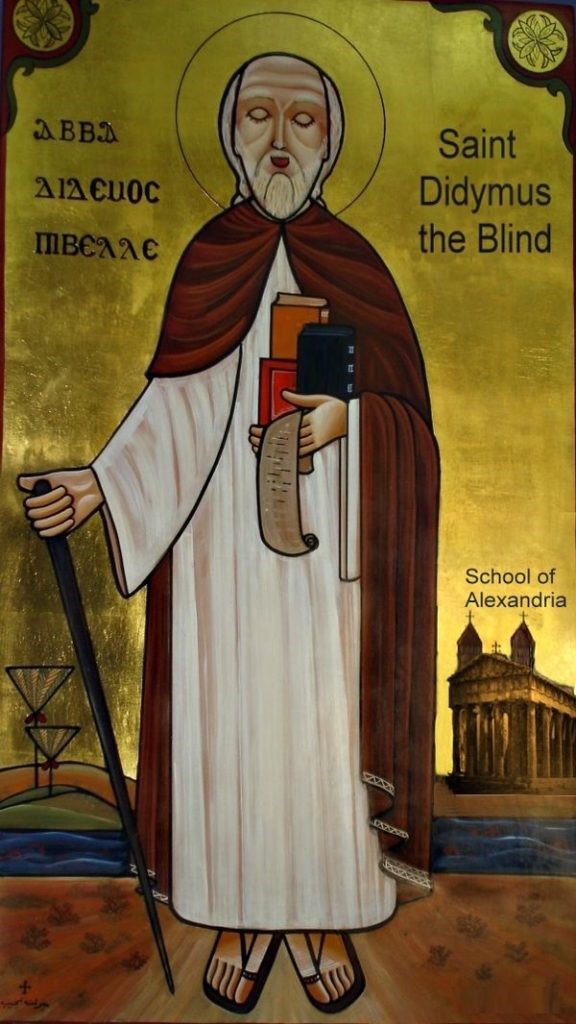– Anastasios
Didymus of Alexandria (310-395), also called “the blind,” was born in Alexandria and lost his sight from the age of 5. He was a very well versed scholar, fond of Plato and Aristotle, and was the head of the catechetical school of Alexandria for many decades. He was a revered teacher and even Saint Jerome and Saint Anthony the Hermit, so said the tradition, wanted to listen to his classes. Didymus was a follower of Origen, the great Christian thinker that was not without reproach from the point of view of orthodoxy. Didymus also was condemned as a follower of Origen in some of his theological mistakes. He wrote many works, also appreciated by Saint Jerome and by Pope Damasus (Jerome, at a certain time of his life, was the secretary of pope Damasus).
He was not a priest or a monk: “Didymus always remained a layman. The idea that he was married rests on a mistaken identification of him with a Didymus to whom one of the letters of St Isidore of Pelusium is addressed. He seemed on the contrary to have lived the life of an ascetic, although in the city and not in the desert. A curious story was told by him to Palladius. One day, when dwelling on the thought of Julian as a persecutor, and on this account having taken no food, he fell asleep in his chair and saw white horses running in different directions, while the riders cried out, ‘Tell Didymus, today at the seventh hour Julian died; arise and eat, and inform Athanasius the bishop, that he may also know it.’ Didymus noted the hour and the month and the week, and it was even so” (Chapman, J. (1908). “Didymus the Blind.” In The Catholic Encyclopedia: http://www.newadvent.org/cathen/04784a.htm).
As we have said, his doctrines raised controversies. In an interesting website (http://www.copticchurch.net) we find some more information about Didymus and his links with Origen and the movement of thinking called Origenism: “Origen’s work in the fields of exegesis and mystical theology was continued by St Didymus the Blind. According to Socrates, St Didymus wrote a defense and exposition of Origen’s De Principiis, of which nothing is extant. He dared to defend Origen and his work as entirely orthodox. He endeavored to show that Origen had been misunderstood by simple people who could not grasp his ideas. St Jerome reports that Didymus gave an orthodox interpretation of Origen’s Trinitarian doctrine but accepted without hesitation his other errors regarding the sin of the angels, the pre-existence of souls, the apokatastasis. No wonder then that in the sixth and following centuries he was condemned as a believer in the pre-existence of the soul and in the apokatastasis. In 553 AD the Chalcedonians anathematized him together with Origen and Evagrius Ponticus for these doctrines in the Council of Constantinople. St Didymus taught St Gregory of Nazianzen (329-389 A.D), Rufinus of Aquileia (c. 345-410 A.D), and St Jerome (c. 342-420 A.D), three figures who spread Origen’s influence and preserved his works.”
Apokatastatis is a Greek word that in the doctrine of Origen means the restoration of the universe in its original state. This doctrine teaches that basically there is no eternity of punishment and that at the end all will be saved: “The doctrine of the apokatastasis is not, indeed, peculiar to St. Gregory of Nyssa, but is taken from Origen, who seems at times reluctant to decide concerning the question of the eternity of punishment. Tixeront has well said that in his De Principiis (I.6.3) Origen does not venture to assert that all the evil angels shall sooner or later return to God (P.G., XI, col. 168, 169); while in his Comment. in Rom., VIII, 9 (P.G., XIV, col. 1185), he states that Lucifer, unlike the Jews, will not be converted, even at the end of time. Elsewhere, on the other hand, and as a rule, Origen teaches the apokatastasis, the final restoration of all intelligent creatures to friendship with God” (Batiffol, P. (1907). “Apocatastasis.” In The Catholic Encyclopedia: http://www.newadvent.org/cathen/01599a.htm). Of course a doctrine as such was seen, correctly, with suspicion by the defender of orthodoxy, even if we may see that it was basically revived century after century until our own days.


 Follow
Follow


